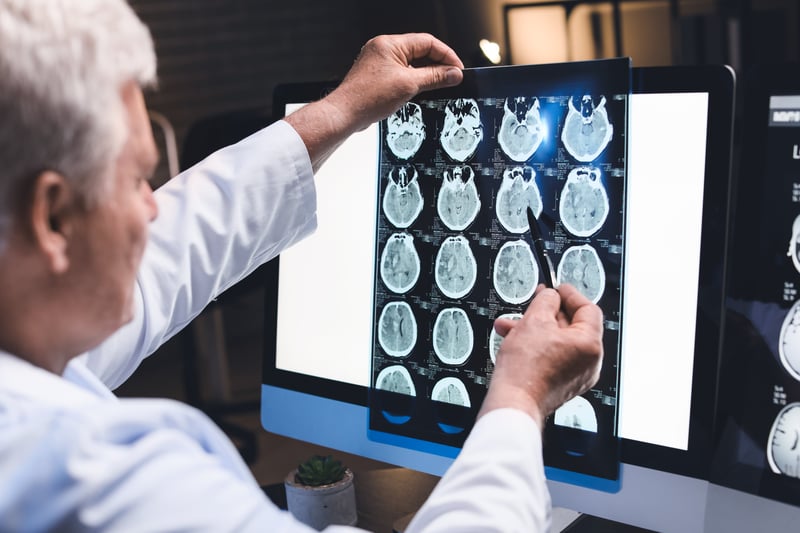Get Healthy!
Results for search "Heart / Stroke-Related: Heart Attack".
08 Aug
Popular Sugar Substitute Linked to Increased Formation of Blood Clots and Heart Risks
A new study out of the Cleveland Clinic finds consuming erythritol increases blood clot formation, a major cause of heart attack and stroke.
28 Sep
Heavy Pot Users Face High Risk of Developing Heart Disease, Study Finds
Adults with cannabis use disorder have a nearly 60% higher risk of suffering a first heart attack, stroke or another major cardiovascular event.
Health News Results - 139
Research has already proven that the blockbuster weight-loss drug Wegovy (semaglutide) can slash a person's odds for heart attacks and strokes, and now more data from the same trial suggests that's even true for very ill patients with heart failure.
The finding also helps clear up a con...
- Ernie Mundell HealthDay Reporter
- |
- August 23, 2024
- |
- Full Page
Spend your youth glued to your phone, computer and TV and you cut your odds of making it to 60, a new study warns.
Data from a study tracking the health of more than 4,000 young adults for over 30 years found a higher odds for heart attack for those who'd spent a lot of time watching TV in their early 20s.
“Our findings suggest that the amount of time young adults spend watch...
- Ernie Mundell HealthDay Reporter
- |
- August 23, 2024
- |
- Full Page
An experimental genetic test can gauge a person’s risk of developing potentially deadly blood clots, researchers report.
People who scored high on the test had more than double the rate of heart attack, stroke and major amputation after they underwent a procedure to re...
- Dennis Thompson HealthDay Reporter
- |
- August 21, 2024
- |
- Full Page
There's more evidence to suggest that the common artificial sweetener erythritol might pose dangers to consumers' hearts.
The new study, involving 20 healthy adult volunteers, found that at doses commonly found in an erythritol-sweetened soda or muffin, the sweetener was linked to heightened activity of blood platelets, which could make clots more likely.
No such effect was seen wi...
- Ernie Mundell HealthDay Reporter
- |
- August 8, 2024
- |
- Full Page
Hospitalization for a heart-related emergency can have profound effects on a person’s mental health, a new study finds.
People hospitalized for heart attack, stroke or other heart-related illnesses were 83% more likely to be diagnosed with a psychiatric disorder withi...
- Dennis Thompson HealthDay Reporter
- |
- August 2, 2024
- |
- Full Page
A healthy mouth also means a healthy heart, a new review suggests.
People who’ve lost teeth are more likely to die from heart problems – and the more teeth lost, the higher the risk, researchers found.
“Our findings clearly show tha...
- Dennis Thompson HealthDay Reporter
- |
- July 30, 2024
- |
- Full Page
People diagnosed with one of the most common inherited heart arrhythmias, called Long QT syndrome (LQTS), can safely engage in vigorous exercise without any added risk for sudden death or cardiac arrest, a new study finds.
"Arrhythmic events were low in these appropriately treated individuals with LQTS in both those exercising vigorously and those exercising moderately or who were sedenta...
- Ernie Mundell HealthDay Reporter
- |
- July 26, 2024
- |
- Full Page
Sleep apnea is particularly dangerous for the heart health of young adults, even more so than in older folks, a new study warns.
The link between sleep apnea and risk factors for heart disease is stronger in people between 20 and 40 years of age than in those 40 and older, researchers reported recently in the Journ...
- Dennis Thompson HealthDay Reporter
- |
- July 11, 2024
- |
- Full Page
Higher amounts of the artificial sweetener xylitol might raise the risk of heart attack and stroke, a new study warns.
Xylitol is a zero-calorie sugar alcohol commonly used in sugar-free candy, chewing gum, baked goods and toothpastes, researchers said.
But high blood ...
- Dennis Thompson HealthDay Reporter
- |
- June 6, 2024
- |
- Full Page
Less than one-quarter of people who survive serious heart conditions receive the dietary counseling needed to protect their future health, a new study finds.
Only about 23% of people treated for major illnesses like heart attack and heart failure receive counseling on their ...
- Dennis Thompson HealthDay Reporter
- |
- June 5, 2024
- |
- Full Page
Folks regularly taking fish oil supplements might not be helping their health as much as they might think, a new study suggests.
Regular use of fish oil supplements could increase the risk of first-time heart disease and stroke among those with good heart health, new research suggests.
However, ...
- Dennis Thompson HealthDay Reporter
- |
- May 22, 2024
- |
- Full Page
Many fewer Americans are falling prey to the most dangerous form of heart attack, a new study says.
STEMI (ST"segment-elevation myocardial infarction) heart attacks have declined by nearly 50% during the past 15 years in the United States, researchers found.
STEMI he...
- Dennis Thompson HealthDay Reporter
- |
- May 3, 2024
- |
- Full Page
Artificial intelligence might be able to help doctors by filling out rote paperwork, but it's not going to be useful in the ER anytime soon, a new study shows.
OpenAI's ChatGPT program provided inconsistent conclusions when presented with simulated cases of patients with
Black and Hispanic Americans are gaining a better understanding of CPR, with a growing number expressing confidence they could use it to save a life, a new survey finds.
About 44% of Black Americans now feel confident performing conventional CPR, up from 30% just three years ago, the American Heart Association (AHA)
Beta blockers appear to be useless when prescribed to heart attack survivors who aren't suffering from heart failure, a new clinical trial indicates.
The study calls into question the routine of prescribing beta blockers to all patients following a heart attack, which has be...
- Dennis Thompson HealthDay Reporter
- |
- April 10, 2024
- |
- Full Page
America is making headway against heart disease, with heart-related deaths declining over the past three decades.
But it appears that only the well-to-do have benefitted, a new study shows.
Heart attack rates have stayed the same or gotten worse among ...
- Dennis Thompson HealthDay Reporter
- |
- April 5, 2024
- |
- Full Page
A new warning is being issued over a heart pump whose use could perforate the heart.
The device has already been linked to over 100 injuries and 49 deaths.
These left-sided Impella heart pumps are made by Abiomed, a subsidiary of Johnson & Johnson MedTech. Abiomed posted the new
Folks with genetically-driven stress are more likely to suffer heart attacks after nerve-wracking events or times of unrest, a new study shows.
People with above-average genetic scores linked to neuroticism and stress were 34% more likely to experience a heart attack followi...
- Dennis Thompson HealthDay Reporter
- |
- March 28, 2024
- |
- Full Page
Living in a poor and unhealthy neighborhood could nearly double a person's risk of heart disease and stroke, a new study says.
The findings indicate that all the factors that make for a crummy neighborhood -- air and water pollution, toxic sites, few parks, tons of traffic -- play a ...
- Dennis Thompson HealthDay Reporter
- |
- March 28, 2024
- |
- Full Page
Medicare will now cover the popular weight-loss drug Wegovy if patients using it also have heart disease, U.S. officials announced Thursday.
The move comes after the U.S. Food and Drug Administration approved drugmaker Novo Nordisk's application to add
Intermittent fasting might be bad for your heart, a new study warns.
People who restricted their eating to an 8-hour window had nearly twice the risk of heart-related death compared to folks who ate freely, results show.
This runs counter to previous research in which intermittent fasting impr...
- Dennis Thompson HealthDay Reporter
- |
- March 19, 2024
- |
- Full Page
Folks who use marijuana have a greater risk of heart attack and stroke, with the odds rising even higher when they partake every day, a new study finds.
Both daily and non-daily marijuana users had an increased risk of heart attack and stroke compared to non-users, researchers reported Feb. 28 in the Journal of the American Heart As...
- Dennis Thompson HealthDay Reporter
- |
- February 28, 2024
- |
- Full Page
A standard blood test can reveal whether a person is at high risk of having a heart attack within six months, a new study shows.
Researchers identified dozens of biomarkers in blood linked to the risk of a first heart attack, according to a report published Feb. 12 in the journal Nature Cardiovascular Research.
<...- Dennis Thompson HealthDay Reporter
- |
- February 16, 2024
- |
- Full Page
As if painful migraines, hot flashes and night sweats weren't bad enough, many women in menopause are facing a significantly bigger threat.
New research suggests that women with both migraines and vasomotor symptoms (hot flashes and night sweats) are significantly more likely to develop heart disease or have a stroke.
"There is a critical need to further refine existing cardiovascul...
- Carole Tanzer Miller HealthDay Reporter
- |
- February 14, 2024
- |
- Full Page
Heart disease remains the United States' top cause of death, but progress is being made and more lives are being saved, a new report finds.
There were 931,578 heart-related deaths in 2021, an increase of less than 3,000 from the year before, the report from the American Heart Association (AHA) showed.
But overall, death rates from heart disease have declined 60% since the 1950s, AHA...
- Dennis Thompson HealthDay Reporter
- |
- January 24, 2024
- |
- Full Page
Taking nitrates for heart problems alongside erectile dysfunction drugs like Viagra or Cialis could be a prescription for trouble, a new study warns.
Men who combine the two types of medications have a higher risk of death or suffering a heart-related health emergency, researchers reported Jan. 15 in the Journal of the American College of Cardiology.
"Physicians are seeing ...
- Dennis Thompson HealthDay Reporter
- |
- January 15, 2024
- |
- Full Page
Snowstorms are blanketing the United States, prompting countless Americans to pick up snow shovels and clear walkways and driveways.
Shoveling snow is more than a chore, however -- it can be a health hazard.
The exertion of shoveling snow increases a person's risk of heart attack or sudden cardiac arrest, warns the American Heart Association.
Snow shoveling has a prominent pla...
- Dennis Thompson HealthDay Reporter
- |
- January 15, 2024
- |
- Full Page
Rum-laced eggnog, mulled wine, or a hot toddy all sound good around the holidays, but too much imbibing can increase your risk of "holiday heart syndrome,"doctors warn.
Holiday heart syndrome is the unofficial name for a notable increase in patients seeking treatment in ERs for heart rhythm problems caused by too much booze around December, said
Late December is typically a time when holiday stress and winter weather can collide, creating a perfect recipe for a rise in heart attacks and stroke.
Luckily, one expert has some advice on how to dodge the danger.
"When we look across the year in terms of heart attack rates, what we see is fairly constant rates week by week with two exceptions: One is that there's a broad, shallow...
- Robin Foster HealthDay Reporter
- |
- December 12, 2023
- |
- Full Page
Hispanic women who experience spikes in blood pressure while pregnant may also face higher heart risks years later, new research shows.
These "hypertensive disorders of pregnancy" (HDP) -- conditions such as preeclampsia, eclampsia and gestational hypertension -- may even have a greater role to play in certain heart risks than regular high blood pressure, the researchers noted.
"The...
- Ernie Mundell HealthDay Reporter
- |
- December 5, 2023
- |
- Full Page
Cutting out just one teaspoon of salt every day lowers blood pressure almost as much as medication does, new research shows.
Investigators said theirs is one of the largest studies ever to include people taking high blood pressure meds in a look at the effect of reducing dietary intake of sodium.
"We found that 70-75% of all people, regardless of whether they are already on blood pr...
- Carole Tanzer Miller HealthDay Reporter
- |
- November 13, 2023
- |
- Full Page
People who regularly smoke medical marijuana may be increasing their risk for a heart attack, heart failure or stroke, new research suggests.
One study found that cannabis use among older patients increases the risk of heart attack or stroke by 20%. The second study found that using cannabis increased the risk of heart failure by 34%.
The studies are scheduled for presentation at an...
- Steven Reinberg HealthDay Reporter
- |
- November 6, 2023
- |
- Full Page
Drones might prove a feasible way to deliver lifesaving defibrillators to cardiac arrests in remote areas, a new research simulation suggests.
Delivering automated external defibrillators (AEDs) by drone could dramatically improve emergency response times in both urban and rural areas, according to findings to be presented Saturday and Sunday at an American Heart Association meeting, in P...
- Dennis Thompson HealthDay Reporter
- |
- November 6, 2023
- |
- Full Page
A new, more comfortable wearable electrocardiogram (ECG) device could be on its way.
Researchers from Australia and India have created a compact, lightweight, gel-free hexagonal-shaped ECG patch that they say is ideally suited for point-of-care diagnostics.
For those at risk, having a wearable device that can detect heart problems and assess overall cardiac health can save lives.
- Cara Murez HealthDay Reporter
- |
- November 1, 2023
- |
- Full Page
As sweltering summer days become more common, the number of Americans who die of heat-related heart problems or strokes could soar over the next few decades, a new study projects.
The study -- published Oct. 30 in the journal Circulation -- estimates that by mid-century the United States will see thos...
- Amy Norton HealthDay Reporter
- |
- October 30, 2023
- |
- Full Page
Older adults who live in distressed or disadvantaged communities are less likely to attend cardiac rehabilitation after common heart procedures, new research shows.
The study looked at Medicare beneficiaries' attendance at these medically supervised exercise and education programs after coronary revascularization between 2016 and 2018.
Coronary revascularization includes procedures ...
- Cara Murez HealthDay Reporter
- |
- October 25, 2023
- |
- Full Page
As a consumer, you probably see "heart healthy" labels on food items all the time. But do you really know what heart health means and why it's important?
Experts from Tufts University in Boston offer some details on how your heart works and how you can safeguard your heart's health.
"It's not as if you turn 65 or 70 and everything falls apart,"said
For sufferers of sleep apnea, continuous positive airway pressure (CPAP) machines may guard against having a second heart attack, stroke or other cardiovascular crisis, but they have to use it consistently, a new study finds.
CPAP works by keeping your airways open during sleep, but because it requires wearing a mask, many people find it uncomfortable so they don't keep it on the amount ...
- Steven Reinberg HealthDay Reporter
- |
- October 4, 2023
- |
- Full Page
Teenage boys who have high blood pressure may find themselves on the road to serious heart problems in adulthood.
Swedish researchers found that boys who had high blood pressure at 18 were at risk for heart failure, heart attacks, strokes and death as adults. And the risk began when blood pressure crossed 120/80 mm Hg, a normal reading.
"Hopefully, the results of this ...
- Steven Reinberg HealthDay Reporter
- |
- September 26, 2023
- |
- Full Page
While the neurological impact of a traumatic brain injury (TBI) has long been studied, new research suggests TBIs are also hard on the heart.
The research team took a closer look at connections between the two organs, finding that nervous system dysfunction, neuro-inflammation, changes in the brain-gut connection and post-injury health issues may increase risk of both cardiovascular and ...
- Cara Murez HealthDay Reporter
- |
- September 22, 2023
- |
- Full Page
Substance abuse and pregnancy may be a dangerous combination.
New research finds that pregnant women with a history of substance abuse had a dramatically increased risk of death from heart attack and stroke during childbirth compared to women with no drug history.
"This telling research shows that substance use during pregnancy doubled cardiovascular events and maternal mortality du...
- Cara Murez HealthDay Reporter
- |
- September 21, 2023
- |
- Full Page
A job that's demanding but less than rewarding may take a big toll on a man's heart health, a large new study suggests.
The study, of nearly 6,500 white-collar workers, found that men who habitually felt stressed on the job had up to double the risk of developing heart disease as their peers who ...
- Amy Norton HealthDay Reporter
- |
- September 19, 2023
- |
- Full Page
If you've had a heart attack, your doctor likely told you to take a low-dose aspirin daily to stave off a second heart attack or stroke, but most people don't follow through with this advice over the long-term.
Those folks who don't take daily low-dose aspirin consistently are more likely to have another heart attack, stroke or die compared with their counterparts who consistently take as...
- Denise Mann HealthDay Reporter
- |
- August 22, 2023
- |
- Full Page
More than 1 out of every 10 patients who land in an ICU with a potentially deadly heart emergency test positive for recreational drug use, a new French study reports.
About 11% of nearly 1,500 patients admitted to a French intensive cardiac care unit for a heart crisis tested positive for cannabis, opioids, cocaine, methamphetamine or other illicit drugs, researchers said in the journal <...
- Dennis Thompson HealthDay Reporter
- |
- August 18, 2023
- |
- Full Page
Whether a patient experiences pain a year after a heart attack -- and not necessarily heart pain -- may predict a person's long-term survival.
New research suggests it is linked with higher likelihood of death within the next eight years.
"Pain causes significant loss of function and may lead to disability, all of which contribute to major, global public health issues. Research in...
- Cara Murez HealthDay Reporter
- |
- August 16, 2023
- |
- Full Page
As more people are advised to shun meat, a new study from Australia adds to evidence that a vegetarian diet can help improve heart health.
A review of 20 prior investigations found that folks who followed a vegetarian diet for six months, on average, saw improvements in cholesterol, blood sugar and body weight.
The study analysis "provides support to the current knowledge that eatin...
- Alan Mozes HealthDay Reporter
- |
- July 26, 2023
- |
- Full Page
Many women are not being counseled about heart disease after giving birth, a new study finds.
Only 60% of at-risk women said they were advised about heart health at their postpartum checkup, researchers say.
About 90% of U.S. women have a doctor visit during what is referred to as the "fourth trimester."
"We need to find ways to take advantage of this prime opportunity when w...
- Steven Reinberg HealthDay Reporter
- |
- July 26, 2023
- |
- Full Page
The extreme heat and choking wildfire smoke blanketing wide swaths of the United States this summer are actively dangerous to heart health, a new study reports.
Days where soaring heat combines with fine particulate air pollution can double a person's risk of a fatal heart attack, researchers have found.
"Heat wave exposure interacts synergistically with fine particulate pollution t...
- Dennis Thompson HealthDay Reporter
- |
- July 25, 2023
- |
- Full Page
Heart disease is a high risk for people with HIV, but a new study finds that taking statins significantly reduces the risk of serious heart incidents.
People with HIV who took a daily statin pill lowered their risk of stroke, heart attack or surgery to open clogged arteries by 35%, a clinical trial funded by the U.S. National Institutes of Health found.
Statins have the potential t...
- Cara Murez HealthDay Reporter
- |
- July 25, 2023
- |
- Full Page
It doesn't matter if you exercise every day or squeeze it all into the weekend. If you do the recommended 150 minutes of moderate to vigorous physical activity a week, you'll get heart benefits, a new study finds.
Both regimens protect you from atrial fibrillation (a-fib), heart attack, heart failure and stroke, compared with inactivity, researchers reported in the July 18 issue of the <...
- Steven Reinberg HealthDay Reporter
- |
- July 18, 2023
- |
- Full Page






.jpeg?w=1920&h=1080&mode=crop&crop=focalpoint)











































